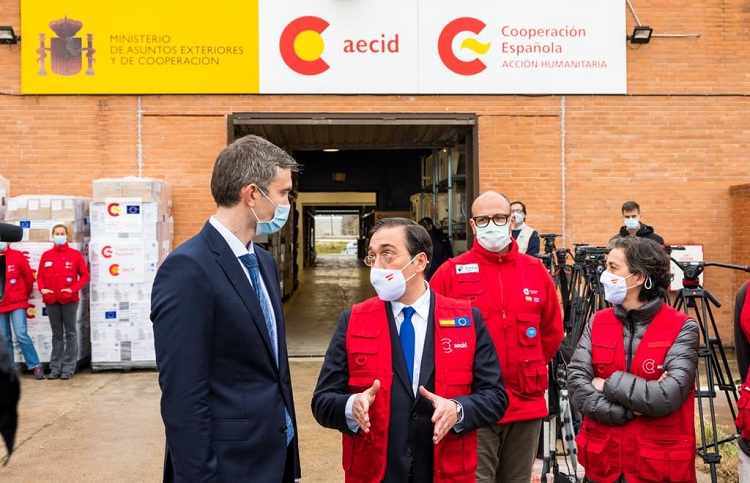The Diplomat
The President of the Government, Pedro Sánchez, yesterday telephoned all the former Prime Ministers to inform them of the situation in Ukraine, while announcing the dispatch of material to protect civilians and 20 tonnes of humanitarian aid.
According to the Moncloa Palace, Sánchez spoke with the socialists Felipe González and José Luis Rodríguez Zapatero, as well as with the ‘popular’ José María Aznar and Mariano Rajoy, with whom he also exchanged views on the situation in Ukraine, following the Russian invasion, and the possible consequences for Spain and Europe.
Yesterday, the head of the Spanish government also spoke on the same subject with the former NATO Secretary General and EU High Representative for Foreign Security Policy, Javier Solana, and with the former Secretary General of the PSOE and former European Commissioner, Joaquín Almunia.
Today, the Minister of Foreign Affairs, José Manuel Albares, is scheduled to take part in a new meeting with his EU colleagues to discuss possible military support for Ukraine, according to the EU High Representative for Foreign Policy, Josep Borrell.
Borrell said on Twitter that the meeting will be held virtually at 18:00 with the aim of “adopting further measures to support Ukraine against Russian aggression”.
The Spanish government announced yesterday that it will send 5,000 helmets, bulletproof vests and mine detectors to Ukraine, in response to the request made by the Ukrainian authorities through the chargé d’affaires in Madrid, Dmytro Matiuschenko, who asked for material to protect the civilian population.
This shipment joins the 20 tonnes of medicines and medical supplies worth more than 150,000 euros that Spain will send by road to Ukraine, at a cost of 10,000 euros, under the umbrella of a Team Europe initiative, the Ministry of Foreign Affairs announced yesterday.
The head of the department, José Manuel Albares, attended the reception of this first shipment of humanitarian aid at the Torrejón air base, accompanied by the director of the Spanish Agency for International Cooperation and Development, Antón Leis, and the chargé d’affaires of the Ukrainian Embassy in Spain.
Speaking to journalists, Albares said that sending this material “is another sign” of Spain’s support and solidarity with Ukraine. “Spain, as a people with strong roots in solidarity, is extraordinarily sensitive to the profound suffering of the Ukrainian population,” he said.
The minister reiterated the Spanish government’s firm condemnation of the invasion of Ukraine by Russia, which has led to significant population movements, mainly towards the western border, which has been collapsed by hundreds of thousands of people who have been forced to flee their country.
The Spanish aid is intended to alleviate the basic needs of this population, which are centred on health and shelter.
The shipment, according to the Ministry of Foreign Affairs, is in response to the request made on 15 February by the Ukrainian government to the European Civil Protection Mechanism, in anticipation of the worsening humanitarian situation.
The Ukrainian appeal includes goods to meet urgent needs: health products and medicines, vehicles, personal protection equipment, blankets, tents, among others.
On the other hand, Albares assured that Spain is not going to “spare no effort” to bring back the Spaniards who are still in Ukraine, although he pointed out that around a hundred “decided of their own free will to stay”. “The majority are dual nationals, Ukrainians with Spanish nationality, or people with deep roots in Ukraine, who had their lives and families there”, he said.
“We made several recommendations, recommending temporarily leaving the country and advising against travelling,” said the minister, who added: “Until the last moment we have maintained the embassy, reducing its staff more and more, to the essential, and it has been operational and open to the service of Spaniards to be able to leave the country”,
He recalled that in the latest convoys to leave Ukraine, almost 100 Spaniards, including the ambassador and the GEO, and that in a previous one, 52 people left.
The two convoys escorted by the GEO continued to advance yesterday towards the border with Poland. According to the National Police on its Twitter account, they are moving slowly, “due to the large number of vehicles trying to leave the country”.
Meanwhile, the support team, which includes around twenty members of the GEO, has already arrived at the border with Ukraine, where it will be responsible for ensuring the passage of the convoys.






